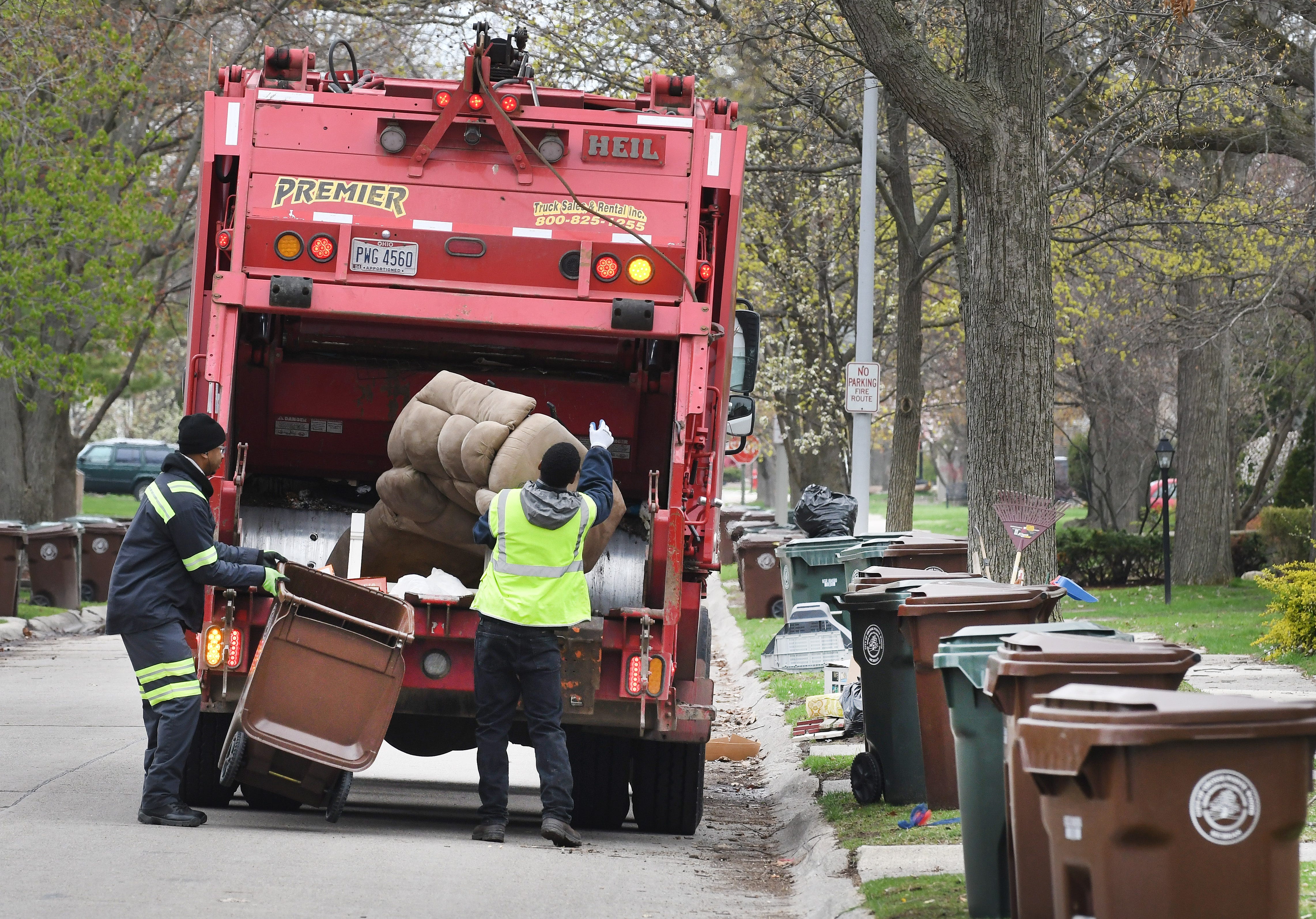Incinerator’s demise delays Detroit area trash pickup
 Christine Ferretti
Christine Ferretti
Detroit — The abrupt closure of the city's incinerator is prompting some residential pickup delays as more of Metro Detroit's waste heads to area landfills.
After generating complaints of foul odors for years and racking up emissions violations, Detroit Renewable Power's trash burning site near Interstates 94 and 75 shut down in March with little warning.
The move has caused logistical challenges for one of the region's largest residential waste hauling firms and left some of the communities that relied on the plant scrambling for emergency solutions of where to send their trash.
"Any time that you have a disposal site immediately fall off the radar there's going to be some disruptions, particularly one as centrally located as that was," said Joe Munem, a spokesman for Green For Life Environmental Inc., a Toronto-based hauling company that has contracts with dozens of communities throughout Metro Detroit and several impacted by the closure.
"We have found that the greatest impact that this closure has on us now is it's increased our travel time back and forth to the landfills. Any time that you have to spend more time doing something that you had previously spent less time on, there's a cost to that involved."
Munem said GFL is analyzing the financial impact of the changes as well as whether additional resources may be needed.
"We're exploring the impact of this, and then we'll make those business decisions accordingly," he said.
Grosse Pointe Woods officials sent out several notices in recent weeks, alerting residents that trash pickup may be later than usual due to the permanent incinerator shutdown.
GFL, a letter from the city noted, "now must travel further to empty its trucks, delaying their daily progress in the Woods." The hauling company, the city added, plans to "keep its crews working extra hours each day to keep your pickup on schedule."
Grosse Pointe Woods, along with Detroit, Warren and Grosse Pointe Park, are now diverting their waste to the Pine Tree Acres landfill in Macomb County's Lenox Township rather than the waste-to-energy facility on Detroit's east side.
The landfill accepts waste from surrounding counties and has more than 20 years of capacity left, said Tanisha Sanders, a spokeswoman for Waste Management.
In total, Waste Management owns and operates three landfills in the Metro area with space for waste being diverted from the incinerator shutdown.
"At this time, we don’t see any logistical complications with accepting more waste," she said.
Grosse Pointe Woods City Administrator Bruce Smith said the hauling distance means some parts of his city are experiencing a several-hour delay in trash pickup. But the waste is still getting picked up and the city hasn't incurred any cost increases.
"Our trash pickup takes a little longer," he said. "Crews work a little bit later into the evening to get stuff finished."
Detroit Renewable Power ended its trash-burning operations on March 27 at the site. The company bought the facility for $200 million two years ago and had invested about $23 million to upgrade it.
But even after the investments, the site still wasn't performing up to the company's expectations and continuing on "just wasn't feasible," said Todd Grzech CEO of Detroit Renewable Energy, the holding company for the plant.
After the closure, Warren quickly secured a temporary deal with Pine Tree Acres for the same price it was paying for the incinerator. The city is now negotiating a permanent agreement with Waste Management, said Mayor Jim Fouts.
Fouts said the city has plenty of room in the interim to house garbage at its east side transfer station until 2023. Warren also is using the South Macomb Disposal Authority station in St. Clair Shores, he said.
"We have plenty of room to store it until we get the negotiations over," he said. "In other words, we have a temporary solution that could last for quite a while. We aren't under the gun."
The Detroit incinerator had accepted 3,000 tons of daily trash. About 90% of what it had been taking in is now being sent elsewhere, Grzech said.
Five days per week, the site is still acting as a transfer station for waste from Detroit's east side. It's taking in 300 to 400 tons per day of trash that's delivered there by GFL. The waste doesn't remain on site. It's being cleared out within the same day by an outside company hired to haul it out to the Macomb County landfill, Grzech said.
"The fact that Detroit Renewable Power is now being used as a transfer station for the city of Detroit has really minimized the impact with them," Munem noted.
The city's west side waste is transported to a city-run transfer station that goes out to the landfill.
Grzech said "things have gone as planned" with the company's goal to have the facility mothballed by the end of May. The future of the site, however, remains up in the air.
The facility is owned by Detroit Renewable Power, but the property belongs to the city.
The two sides have a decades-old agreement that calls for Detroit Renewable Power to process and dispose of the city's trash through 2021. The company's lease of the land runs through 2035.
John Prymack, director of Greater Detroit Resources Recovery Authority, which manages waste and recycling services in the city, said Detroit is paying $25 per ton with Detroit Renewable Power. He doesn't expect the city would want to negotiate a premature end to that deal.
"I'd imagine we wouldn't want to get out of this contract," he said. "If we did, our rates would go up."
Under the agreement with Detroit Renewable Power, the city can't be burdened with any additional costs.
"It could potentially (be more costly) for us," Grzech said, "if we can't work out an agreement to get somebody to take it at the same price."
The city also contracts with GFL and Florida-based Advanced Disposal to collect household solid waste. A renewal of those agreements were approved Tuesday by Detroit's City Council.
Detroit Renewable Power is not currently permitted for other uses, Grzech noted. But he stressed there are no plans to resume the operation.
"At least the current owners have no intention of doing that, and we're not looking at selling to somebody who would," Grzech said.
Grzech on Tuesday told City Council members that Detroit Renewable Power was working with the city on the best future use.
"As people know, the Wayne County correction facility is being built adjacent to there," said Grzech, adding "there's been some suggests that that may fit in."
"I would assume at some point we would end the lease as it's written as we wouldn't have any future use for that piece of land."
Grzech said that Detroit Renewable Power's permits will stay in place for the short term as the site continues to accept waste from the city's east side and to run its boilers. The company intends to use fuel to do so for two days later this month to produce steam.
Energy provided from the facility will now be handled by the Detroit Thermal natural gas facility near Ford Field. That facility is also owned by Detroit Renewable Energy.
The incinerator, originally built and operated by the city of Detroit, was regarded as one of the largest municipal solid waste facilities in the nation, burning garbage into energy for city customers.
The hydrogen sulfide it emits from decomposing food have long prompted residents and environmental groups to lobby for its closure, arguing the site is disrupting their quality of life.
The incinerator has been under two consent agreements with the state and has exceeded pollution emissions standards more than 750 times over the last five years, according to a recent report by a campaign of environmentalists and community members fighting to get the plant closed.
The Great Lakes Environmental Law Center has been weighing legal action against the incinerator. It's yet to determine whether it will proceed, said Nick Leonard, the center's executive director.
Leonard said there's a lot of joy in the community but questions remain. Namely, what type of legacy pollution may be associated with a site like this.
"Did emissions from the facility contribute to heavy concentrations of soil pollution in the area and do we still have to worry about that, even if the facility itself is no longer operating?" he said.
The site was issued a violation notice from the state in recent weeks tied to its handling of solid waste.
The notice, dated April 23, cited inspections that on multiple occasions turned up litter along the fence line and "significant garbage debris" in the plant yard, according to the notice from the Department of Environment, Great Lakes, and Energy.
Grzech said that the facility is dealing with some past and some current violations from the state. When the operations were curtailed in March, there were about 7,000 tons of waste on the floor that was finally cleared out within the last couple of weeks.
The plant closure also impacted 150 workers, about 40% of whom are Detroit residents.
Dan McKernan, a spokesman for the Operating Engineers Local 324, which represents the employees, said a severance agreement has since been worked out and efforts are being made on the part of the city, incinerator operators and the union to find workers new positions.
"It's definitely still making the best of a bad situation," he said. "We’re working hard to try to make whatever transition is necessary for each of these members as easy as we can."
cferretti@detroitnews.com